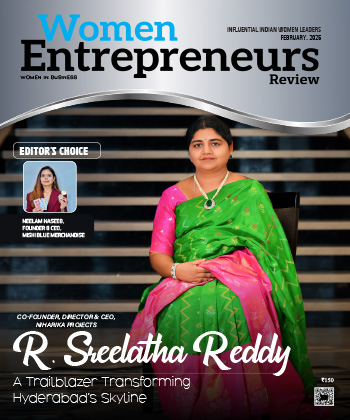
Embracing Agile Learning to Thrive in Dynamic Environments
By: Niranjani C, CFO, Kenvue
Niranjani C is a seasoned Finance and Business leader with 23+ years of experience across Fortune 500 companies, including Unilever, P&G, Nokia, and Hershey. As Regional CFO at Hershey International, she drives financial and digital transformation. A CFA ranker, she champions diversity, innovation, and leadership development.
In an insightful interaction with Women Entrepreneurs Review Magazine, Niranjani C shares her insights on navigating inflationary pressures, evolving shareholder expectations, and aligning digital transformation with business goals. She also discusses mentoring future leaders in financial value creation and digital innovation in the article below.
In light of inflationary pressures and evolving consumer behavior, how should organizations reimagine their value propositions to sustain growth while maintaining financial resilience?
As you know, 2024 has been a challenging year for most FMCG players marked by modest volume growth, changes in consumption pattern, high inflation and geo-political uncertainty. As we pivot into 2025, companies need to reimagine their growth algorithm, re-evaluate consumer value and re-wire investments in order to win in this market environment. Revenue management will require every tool from its toolbox especially as inflation is hitting hard and pricing is not sustainable beyond a certain level.
New growth avenues like Q-com (in India), innovation led portfolio transformation, and premiumization and mix management via price-pack architecture would be key levers. In order to meet the evolving consumer behavior, a standard cookie cutter approach will not work, offerings need to be differentiated and tailor-made for the market and consumer set in order to stand out. Companies will need to develop an ongoing ‘test and learn’ approach and cannot rest on past models of success. In addition, most importantly, these need to be done in a financially disciplined and prudent manner to add long-term shareholder value.
Looking at the current state of shareholder management, do you see a shift in how investors evaluate long-term value creation versus short-term returns? How do you align this evolving expectation with the need for sustained business growth?
Post covid demand stabilization, FMCG sector globally has been seeing some downtrends in its TSR (Total Shareholder Return) versus the historical levels. The overall play has become more challenging with macro-economic slowdown, consumer fragmentation, evolution in media consumption, and increase in retail bargaining power, flattening of scale advantages and squeezing of margins. Investors are obviously pushing for the industry to return to top quartile TSR performance and the next 5 years will be a tight ropewalk for most companies. Investors will push for greater consolidation, sustainability actions, improved productivity and faster identification of business models to drive growth. Investor activism is also on the rise and will likely bring additional pressure on the Board and management. The key is to stay undistracted and focus on building new competitive advantages viz. digital upgrade, agile supply chain or scaling commercial excellence to outperform within your peer set. India is better placed on a relative scale backed by its demographic profile and consumption led economy. The recent budget announcements also augur well for the FMCG sector and this should help increase consumer spending leading to faster revival.
How do you ensure that technological advancements are not just implemented for innovation’s sake, but are strategically aligned with core business goals?
Digital transformation is a strategic imperative for the industry in current times and no longer a ‘nice thing to do’. Any transformation to be successful has to be dovetailed to the business strategy, needs to add value incrementally - whether growth, productivity or cost and should be scalable for its future needs. It’s critical to start with a clear 3-5 years glide path on what the transformation seeks to achieve, what constitutes success and keep measuring impact versus intent at a granular level. The organization will need to be re-wired to adopt a digital mindset with databased decision making. This structure will encourage greater collaboration and steer the teams’ thinking towards solutions and actions.
In today’s landscape, how do you see the role of finance evolving into a driver of innovation and corporate transformation? What shifts do you believe are critical for finance leaders to embrace?
In today’s rapidly changing environment, the role of Finance in leadership has been redefined. Gone are the days when Finance was considered a safe guard - budget control or accounting function. Finance in the VUCA world is focused on driving strategic long-term value creation for the enterprise, leading transformations and driving innovation while still holding the reinson risk management, controls and profitability. Further, with the onset of big data, the role of Finance is akin to that of ‘lighthouse’ helping business navigate whirlwinds of disruption by driving business agility through accelerated decision making, However, it’s in the hands of every Finance professional to harness this potential and carve their career journey.
As a passionate mentor, how do you approach developing the next generation of leaders? What’s your advice to young professionals looking to navigate the intersection of finance and digital transformation?
As the saying goes ‘what got you here may not get you there’, it’s imperative to understand what are the skills that can help differentiate one from another. Have put down top five skills that can help young finance professionals to stay on top of their game.
- Understand business models: Finance leaders need to embrace a ‘consulting mindset’ by becoming industry experts and focus on identifying growth opportunities and driveenterprise value creation. The ability to decode growth algorithms and adapt them to the current business context will helpunlock greater value across the value chain.
- Agile learning mindset: The pace of change in the business world has accelerated and one must be able to adapt quickly to new challenges and opportunities. Whether it’s adjusting to macroeconomic shifts, integrating sustainability into business plans or capitalizing on new market trends, one needs to be open, agile and flexible.
- Art of effective story telling: Storytelling is a must-have skill that executives need to hone. When a complex problem is simplified, broken down into a narrative and fed, it becomes engaging and there is higher receptivity from the audience.
- Collaborative leadership: Finance leaders are expected to collaborate with teams across various functions and ‘drive business alignment’. This requires one to develop collaborative leadership skills and demonstrate collective ownership.
- Influence without authority: In order to lead effectively and get the job done, one must be able to influence 360 degrees, many times without authority. The secret to doing this is by (i) building trust and credibility, (ii) having cleared, consistent, communication (iii) building relationships and alliances and (iv) leading with emotional intelligence. These skills honed over a period will help position oneself as a ‘go-to’ person in the organization.
Most Viewed
- 1 Women's Health Startup HerMD Closing Doors Amid Industry Challenges
- 2 5 Famous Women in Indian Armed Forces
- 3 Saudi Women No longer Require Male Permission for Clothing Choices, says Prince MbS
- 4 Kolkata Medtech Startup Innovodigm Raises Rs 5.5 Crore Seed Funding Led by IAN Group
- 5 Yamunanagar's Kashish Kalra Honoured after Securing 111th Rank in UPSC Civil Services Exam
- 6 Madurai Appoints Its First Woman Corporation Head
- 7 IAS Vijayalakshmi Bidari Appointed as the new Nagpur Divisional Commissioner
- 8 American Entrepreneur Lucy Guo Overtakes T Swift to become Youngest Female Billionaire
- 9 ICC Women's World Cup 2025 Trophy Showcased at Indore's Holkar Stadium
- 10 Aparna Saxena's Beauty Venture AntiNorm Launches in India
- 11 Vidya Nataraj Co-Founded BlueStone Jewellery & Lifestyle files IPO
- 12 5 Women Freedom Fighters of India
- 13 Dr. G Krishnapriya appointed as CEO for Trichy
- 14 M3M & Sirona Partner to Introduce Menstrual Hygiene Vending Machines in 15 Locations
- 15 Punjab Govt launches SHE Cohort 3.0 Supporting Tech-led Women Startups
- 16 Indian origin Lawyer, Sweena Pannu appointed as the US New Superior Court Judge
- 17 The Aurora Tech Award recognizes 4 Indian Women-led Startups
- 18 Kerala's Republic Day parade featured an all-female tableau
- 19 Manisha Kabbur Becomes Karnataka's First Woman International Karate Coach
- 20 Director K. S. Ravikumar's Daughter Maalica Ravikumar Launches Life Coaching Company 'Evergrowth Academy' for Women
- 21 Leezu's Raises Pre-Seed Funding to Accelerate Growth in Sexual Wellness Industry
- 22 Sattu: Super-easy summer drink for PCOS gut healing
- 23 Swathi Nelabhatla creates Sitha App, India's First Women-Exclusive Gig Platform
- 24 7 Timeless Female Kathak Dancers & their Iconic Legacies
- 25 Meet 7 Iconic Women Architects of Modern India & their Most Impactful Work
- 26 This Woman-led Insuretech Startup is Helping Bridge the Education Financing Gap in India
- 27 Women Leaders Share Lessons Learnt from India Women's WC Win
- 28 5 Enterprising Women Founders Powering Singapore's Tech & Innovation Landscape
- 29 4 Women. 4 Stories. One Vision for Smarter, Stronger Healthcare
- 30 Global Gender Gap Narrows to 68.8%, But Full Equality 123 Years Away: WEF Report 2025
- 31 Changemakers: 7 Women Entrepreneurs Taking the Make in India Movement Forward
- 32 Meet Lucy Guo, The Youngest Self-Made Female Billionaire Disrupting Tech
- 33 How Women are Driving India's Festive Online Shopping Surge






